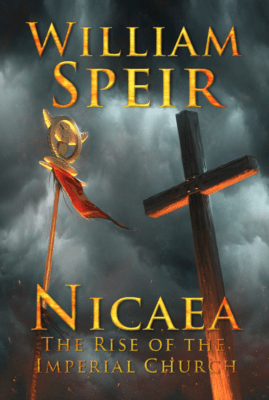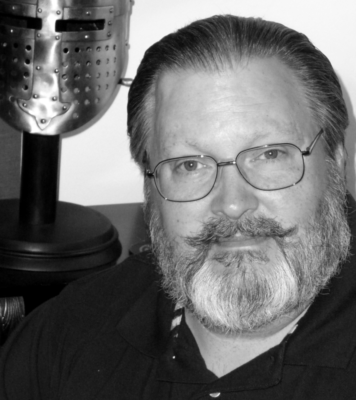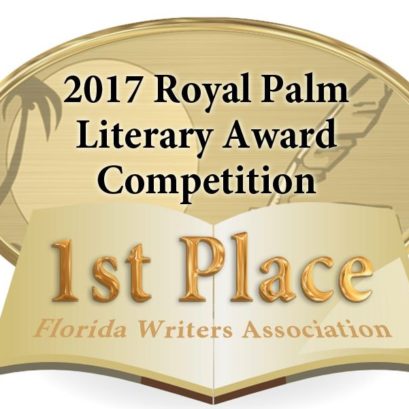2017 Published Historical Fiction

Nicaea – The Rise of the Imperial Church
William Speir

A novel about the political intrigue surrounding the Council of Nicaea 325 AD, which created the blueprint for the Christian churches as a tool of statecraft for the Emperor.
Award-winning author William Speir was born in Birmingham, Alabama, in 1962, attended the University of Alabama, and graduated from the University of Alabama at Birmingham in 1984.
At the 2017 Royal Palm Literary Award Banquet, author William Spier won First Place for his Historical Fiction. Each year at the RPLA Banquet, authors experience the joy of earning accolades for all the hard work that is often done in the privacy of the home with little to no recognition. We’re showcasing the best of the best with our First Place winners spotlight. Not only does RPLA recognize extraordinary talent, but we’re giving readers an opportunity to sample excerpts from the winning stories.
Click the link to read a sample: Nicaea – The Rise of the Imperial Church – Chapter 1
An Interview with William Speir.
Q: Where do you get your story ideas?
A: Inspiration comes from a variety of sources: television, films, conversations with friends and colleagues, books, research for other books I’m working on, and from the universe itself. The ideas for “Nicaea – The Rise of the Imperial Church” go back to a series of Bible workshops I attended in the early 1990s, taught by a dear friend of mine. In cleaning out some old folders on my computer, I came across some notes I had taken during those workshops, and I found the ones for the workshop on the Council of Nicaea in 325 AD. After reading the notes again, the entire story for “Nicaea – The Rise of the Imperial Church” came to me in a flash, and I spent the next three weeks getting all of the plot points documented and researching the key players from that council meeting. It was like a fountain pouring out ideas, and the “water” didn’t finally subside until the first draft was finally completed. This is the way most of my book ideas come to me.
Q: Anything in particular about your award-winning RPLA entry that you’d like to share?
A: While this is a work of fiction, it is based on actual historical facts. The central characters were real people who took part in the events described in the book. I attempted to present these people as real people and not as the caricatures that dogma, theology, and history have since painted them. The lead character, Arias, has been vilified by history, and I wanted to explore the events around the Council of Nicaea from his perspective. Why was he vilified? What did he do that was so terrible he had to be banished from the Roman Empire? While shrouded in one of the greatest theological debates in history, this is a political thriller set in 325 AD with Arias and his faith on one side, and the Roman Emperor and his minions on the other. Whether you read religious history or not, this book will appeal to anyone interested in how the Roman church actually came into being.
Q: Who do you credit with inspiring your writing?
A: The people who have influenced my writing the most include Frank Herbert, J. R. R. Tolkien, David Eddings, Tom Clancy, James Clavell, Mary Stewart, Michael Shaara, Shelby Foote, and even J. K. Rowling. But it is my wife who inspires me to write and to be the best writer I can be.
Q: Any tips for new writers?
A: Get into this business with your eyes wide open. As writers, we write first-and-foremost for ourselves, but if we want to be read, we have to write what others want to read, not what we want to write. It’s often a difficult balance between writing what we want to write and writing what others want to read; but if you want to be published and have a following of loyal readers, you must write for them and not for just yourself. You must be thick-skinned, because critics and readers will be brutally honest about what they like and don’t like with your writing. We create stories out of our imagination, but once these stories are in the hands of others, they have a life of their own that we can no longer completely control. You must be able to separate yourself (ego) from your work; it’s not unlike a parent watching a child leave home (you retain pride in their accomplishments, but you have to watch most of it from the sidelines). Never forget that publishing is a business, and the professionals in that business are in it to make money. If you make them money, they’ll love you, but if you don’t make them money, they’ll drop you like a stone, making it twice as hard the next time you want to publish. And lastly, remember that thousands of books are released every single day, thanks to self-publishing. No matter how good your book is, you have to compete against the hundreds of thousands of books currently in publication. Somehow, you have to convince people that your book is the one they want to purchase and read next, and then you have to deliver something so good that your readers will recommend your book to everyone they know. You must spend every waking minute marketing your book, and yourself, if you want to grow your readership into a force powerful enough to increase your sales sufficiently to break even, let alone make a profit. It’s no different than raising a child. Your book is your child; raise it well.
Thank you for sharing, William, and congratulations! Visit his website: www.williamspeir.com.
Ready to read the rest of the book? Click the link to purchase Nicaea – The Rise of the Imperial Church
A message about supporting literacy in Florida:
If every member of FWA went to Smile.Amazon.com, chose Florida Writers Foundation, Inc. as their charity and, instead of logging into Amazon.com, logged into Smile.Amazon.com, FWF would receive 0.5% of the purchase funds. Every time.
We could significantly fund the literacy efforts of our organization. No money out of your pockets…just some invested time to set this up.
How easy for us to make a difference. To see all of our work, please read the pages of our website www.floridawritersfoundation.com. You’ll be proud.
Tom Swartz, President, FWF


barbara fifield
Sounds like a good book to read, Ronnie! I’ve always been interested in this subject.